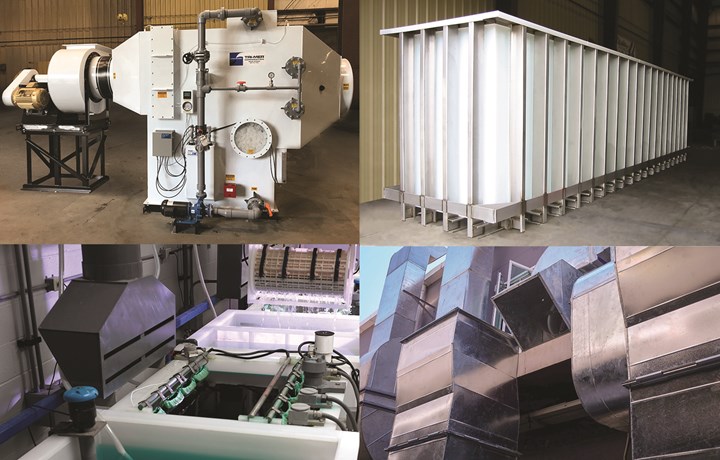Air Pollution Control for Finishers
Tri-Mer manufactures and installs pollution control systems for plating, anodizing and powder coating.

Tri-Mer manufactures and installs pollution control systems for plating, anodizing and powder coating. Chemical-free fan/separator scrubs corrosive fumes with 1/10th the water of traditional scrubbers. Crossflow, for inorganic compounds, maintains stack emissions to specific ppms. Odor control systems simultaneously handle particulate and inorganic compounds. The C/E-1 Chrome Scrubber is 99.5%+ efficient for all chrome regardless of inlet loading, and doesn’t consume chemicals or generate waste. Whirl/Wet self-cleaning wet dust collector uses minimal water, is 99%+ efficient for particulate 3+ microns. Stand-alone equipment or turnkey systems are available, including tanks, ducting, exhaust hoods and material handling.
Tri-Mer Corp. | 989-723-7838 | tri-mer.com
Related Content
-
NASF/AESF Foundation Research Project #120: Electrochemical Destruction of Perfluorooctanesulfonate in Electroplating Wastewaters – January – December 2023
This NASF-AESF Foundation research project report covers quarterly reporting for the year 2023 at the University of Illinois at Chicago. The objective of this work is to utilize a cost-effective reactive electrochemical membrane (REM) for the removal of PFAS from synthetic electroplating wastewater. Discussed here are the oxidation of PFOA with three different catalysts, development of a method for detecting PFAS, as well as work on 6:2-fluorotelomersulfonic acid (6:2 FTS) and electrodeposited bismuth/tin oxide catalysts.
-
NASF/AESF Foundation Research Project #120: Electrochemical Destruction of Perfluorooctanesulfonate in Electroplating Wastewaters - April 2022-March 2023
This NASF-AESF Foundation research project report covers project work from April 2022 to March 2023 at the University of Illinois at Chicago. The overall objective of this work is to utilize a cost-effective reactive electrochemical membrane (REM) for the removal of PFAS from synthetic electroplating wastewater. Initial results for the oxidation of PFOA with three different catalysts are discussed.
-
NASF/AESF Foundation Research Project #122: Electrochemical Approaches to Treatment of PFAS in Plating Wastewater - 12th Quarterly Report
This NASF-AESF Foundation research project report covers the 12th quarter of project work (October – December 2023) at the University of Georgia. In our previous report, we described our work on performance and effect of surface fluorinated Ti4O7 anodes on PFAS degradation in reactive electrochemical membrane (REM) mode. This quarter, our experiments involved utilizing porous Ti4O7 plates serving both as anodes and membranes. Tests compared pristine and F-18.6 Ti4O7 anodes at current densities of 10 mA/cm2 and 40 mA/cm2. This 12th quarterly report discusses the mechanisms of the effects on EO performance by anode surface fluorination.












